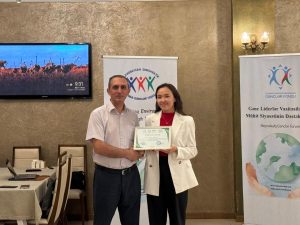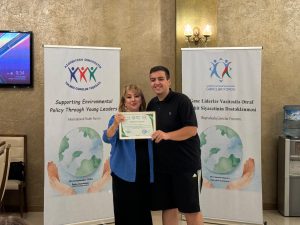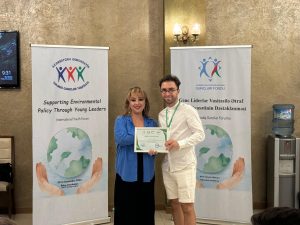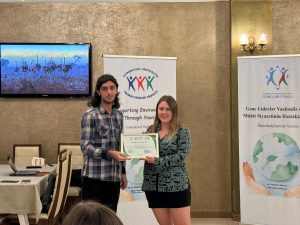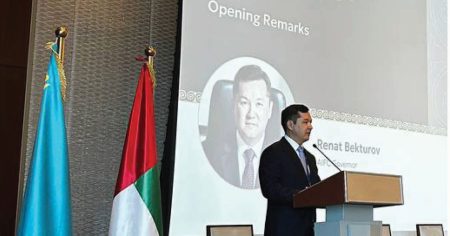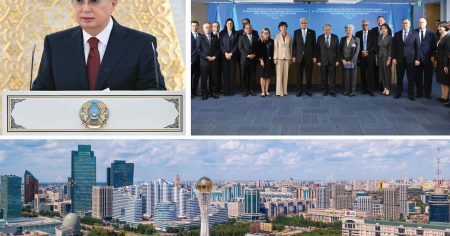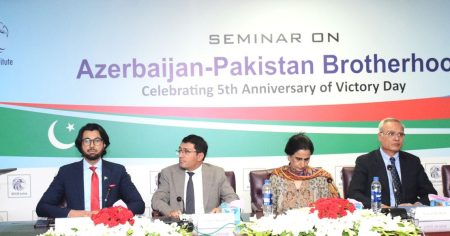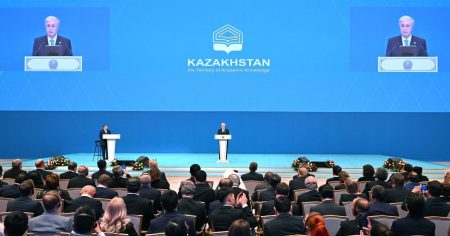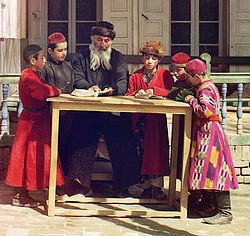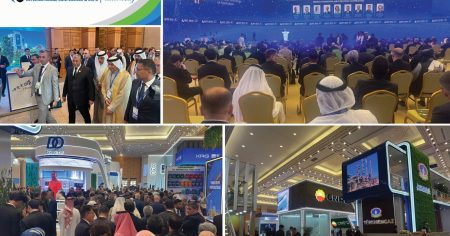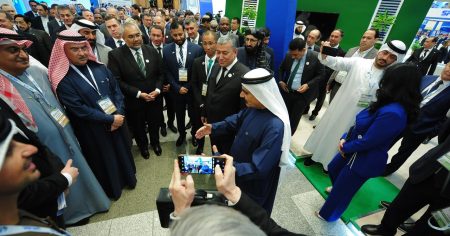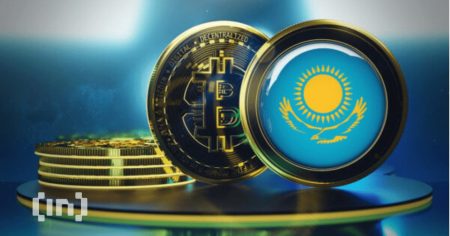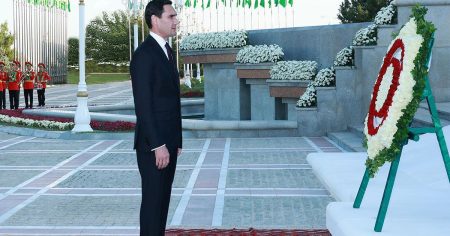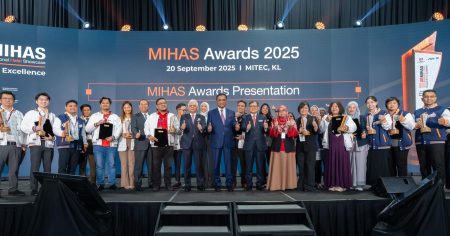Global environmental problems are now spreading across the world, affecting
every region and population. Issues like climate change, global warming, and the
increasing levels of carbon dioxide in the atmosphere have become critical concerns not
only for world leaders but also for non-governmental organizations (NGOs) and youth
organizations. These environmental challenges pose a threat to the sustainability of life
on the Earth, and their impacts are already being felt in the form of extreme weather
events, loss of biodiversity, and rising sea levels.
Recognizing the urgent need for action, NGO experts and young leaders from 18
countries – Azerbaijan, France, Finland, Denmark, Norway, Czech Republic, Bulgaria,
Romania, Hungary, Poland, Latvia, Lithuania, Turkiye, Moldova, Russia, Ukraine,
Georgia and Kazakhstan gathered at the International Youth Forum led by the
Azerbaijan Democratic Student and Youth Organization (ADSAYO) with financial
support of Azerbaijan Youth Foundation (AYF) in Baku, held from September 9 – 12,
2024.
This Forum, taking place on the eve of the COP29, provided a platform for
meaningful dialogue and collaboration on environmental issues. Over the course of the
event, four key panels were conducted, allowing participants to exchange ideas, share
best practices, and explore potential solutions to some of the most pressing
environmental challenges of nowadays.
The Forum has come to the conclusion declaring the following
To Obtain the Opinions of Non-Governmental Organizations (NGOs) on
Environmental Policies to foster dialogue with NGOs on environmental
policies.We areready establish regular forums and discussion panels where
NGOs can provide insights into current policy shortcomings and share best
practices. These exchanges can be formalized into recommendations for local
governments and international organizations, helping to shape future
environmental policies.
Supporting NGOs in their Work on Environmental Protection offering technical
assistance, funding opportunities, and training programs. We are readyto equip
NGOs with the tools needed to be effective advocates for environmental
protection. Additionally, partnerships with international organizations will
strengthen these NGOs, enabling them to implement larger-scale environmental
projects and foster local action.
Contributing to the Promotion of COP29 through Civil Society COP29 is a critical
moment for environmental action, and through outreach campaigns, webinars,
and social media activism. The forum is calling to engage civil society in
promoting the conference’s goals. Youth-led advocacy initiatives can raise
awareness about the decisions being made at COP29 and how they affect global
environmental strategies. This can be achieved through collaborations with
media outlets and environmental influencers to expand the reach of COP29’s
messages.
Organizing International Conferences International conferences on
environmental issues will bring together stakeholders from different regions,
enabling cross-border cooperation. These events will focus on generating
actionable solutions for common environmental challenges. Workshops, panels,
and networking opportunities at these conferences will allow participants to
exchange ideas, form alliances, and launch collaborative projects aimed at
combating environmental degradation.
The Responsibilities and Competencies of NGOs in Developing Environmentally
Friendly Behavior NGOs play a key role in educating the public about eco-
friendly behaviors. The forum is going to promote sustainable practices such as
recycling, reducing carbon footprints, and conserving natural resourcesthrough
educational campaigns, eco-volunteer programs and workshops. NGOs can lead
by example, implementing green policies within their organizations and
advocating for systemic change.
The Forum participants are calling to promote success stories and best practices
through media campaigns, reports, and international platformsthrough promoting
the Work of NGOs on Environmental Protection to ensure that the work of NGOs
is recognized and supported. Highlighting their achievements will not only inspire
others but also attract funding and partnership opportunities from government
bodies and international donors.
Increasing Regional Cooperation between Civil Society and Public Institutions by
creating joint task forces and public-private partnerships. We are ready to
strengthen collaboration between civil society and governmental agencies. These
partnerships will ensure that civil society voices are represented in policymaking
processes and that NGOs can contribute directly to the development and
implementation of environmental policies.
Creating International Cooperation among NGOs the Forum will support the
creation of an international NGO network that focuses on environmental
protection. This network will facilitate the sharing of resources, strategies, and
data between NGOs from different countries. Regular meetings, both online and
in-person, will ensure continuous collaboration and mutual support for large-scale
environmental projects.
Azerbaijan’s unique environmental policies will be showcased at international
events and conferences, particularly focusing on its efforts in sustainable
development, energy efficiency and biodiversity conservation. Highlighting these
policies will promote Azerbaijan as a model for other countries, encouraging the
exchange of successful environmental governance practices.
Promoting Civil Society Work on Environmental Protection in Azerbaijan through
public campaigns, community-based initiatives, and educational programs. The
forum is going to raise awareness about the crucial role of civil society in
protecting Azerbaijan’s environment. These programs will engage the public and
inspire them to participate in eco-volunteering activities. Additionally, NGOs will
collaborate with schools and universities to involve youth in environmental
activism, ensuring the sustainability of these efforts.
In conclusion, this International Youth Forum and the Baku Declaration provide an
essential platform for promoting environmental policy and action through youth
leadership and collaboration. By supporting the outlined goals with tangible
initiatives, civil society organizations, particularly NGOs, can work together across
borders to address the pressing environmental issues of our time. Our concerted
efforts will contribute to a more sustainable and resilient future, while ensuring that
young voices and innovative ideas are at the forefront of global environmental
governance.
13 August 2024, Baku, Azerbaijan
1. Lise Nicolas – France, M & Mme Recyclage NGO
2. Aneta Havrankova – Czech Republic, Help People z.s. NGO
3. Aleksandra Pierzchala – Poland, SKILL NGO
4. Kenneth Isaac Grajales – Norway, Nordic Youth Network NGO
5. Laura Maria Rajala – Finland, Green Habito NGO
6. Evelina Lekesiute – Lithuania, AY Institute NGO
7. Alika Oraztayeva – Kazakhstan, GreenUp NGO
8. Ilias J. Shawkat – Denmark, Concordia Europe NGO
9. Russu Nicolai – Moldova, Youth Vision NGO
10. Marianna Lipnicka – Latvia, Bioville NGO
11. Manuel Apostol – Romania, Versontul Portizonilor NGO
12. Iryna Polishchak – Ukraine, “Start” NGO
13. Erdem Guler – Turkiye, GCCDRN NGO
14. Alexsandra Cseuz – Hungary, Ecocenter Alapitvany NGO
15. Elena Minzat – Moldova, YMCA NGO
16. Gozde Nur Kaya – Turkiye, EIC NGO
17. Sergei Manakov – Russia, Youth Parliament of RF
18. Rezo Kakhniashvili – Georgia, RDYE International NGO
19. Vildan Demirkıran – Turkiye, KHU NGO
20. Didari Makharadze – Georgia, M&MFA NGO
21. Hrisiyana Petrova – Bulgaria, BYA NGO
22. Saba Sambelashvili – Georgia, YGG NGO
23. Asif Asgarli – Azerbaijan, ADSAYO NGO
24. Amin Mammadov – Azerbaijan, PAWU NGO
